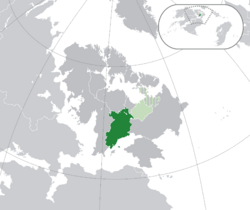Hyacinthe
This article is incomplete because it is pending further input from participants, or it is a work-in-progress by one author. Please comment on this article's talk page to share your input, comments and questions. Note: To contribute to this article, you may need to seek help from the author(s) of this page. |
Worker's Republic of Hyacinthe République ouvrière d'Hyácinthe (Hyacinthean) | |
|---|---|
| Motto: Sic semper tyrannis (Hernician) "Thus Always to Tyrants" | |
| Anthem: Les yeux tournés vers demain (Hyacinthean) "Eyes on Tomorrow" | |
 Location of Hyacinthe (dark green) in Calesia (green & dark gray) | |
| Capital and largest city | Lisieux |
| Official languages | Hyacinthean |
| Recognised regional languages | |
| Ethnic groups | 67.5% Hyacintheans 18.1% Valdaurs 12% Uldirens 4.5% other |
| Demonym(s) | Hyacinthean |
| Government | Federal Lavorist socialist republic |
| Alban Vaillancourt | |
| Jean-Noël Rigal | |
| Legislature | People's Assembly |
| Formation | |
• X | X |
| Area | |
• Total | 438,531 km2 (169,318 sq mi) |
| Population | |
• 2020 estimate | 87,532,230 (5th) |
• Density | 199.6/km2 (517.0/sq mi) |
| GDP (PPP) | 2024 estimate |
• Total | |
• Per capita | |
| GDP (nominal) | 2024 estimate |
• Total | |
• Per capita | |
| Currency | Hyacinthean livre (£, HYL) |
| Time zone | UTC+0 (Central Calesian Time, CCT) |
| Date format | dd/mm/yyyy (CE) |
| Driving side | left |
| Calling code | +X |
| Internet TLD | .hy |
Hyacinthe (Hyacinthean: Hyácinthe), officially the Worker's Republic of Hyacinthe (Hyacinthean: République ouvrière d'Hyácinthe), is a sovereign state located in Central and Southern Calesia[a]. It borders Falland, Dahemia, and Thuisland to the north, West Ruthen to the northeast, X to the east, X to the west, and the X Sea to the south. Lisieux is Hyacinthe's capital and most populous city, while other major cities include Sèvremoine, Feneu, Fontannes, Argillières, and Cachan. With a population of approximately 87 million and a total area of 438,531 km2 (169,318 sq mi), it is the 5th most populous and 6th largest country in the world, as well as the single-largest country in Calesia by area and population.
Historically, Hyacinthe has been the site of numerous civilizations ever since humans first migrated to the area in ancient times. Most notably, the Hernicians emerged in the 8th century BC, first as a kingdom, before becoming a republic, and lastly, an empire. The Hernician Empire would go on to dominate much of Calesia for centuries, before eventually falling to Waldic tribes in the 5th century AD. During the 9th century, the Second Hernician Empire would be formed by the House of Karling, but was broken up by the Treaty of X in 902. In the 11th century, the Hyacinthean Empire, ruled by the Pernet dynasty, would grow to become one of the most powerful feudal kingdoms in Calesia, invading Falland and forming the Kingdom of Robindy, but had their prosperity cut short by the Catabole. In the ensuing crisis, the nation suffered from famine and disease, and the death of a significant portion of their population. The !Reformation gave rise to new Gregorian branches, such as the !Cathars and !Calvinists. Colonial efforts also started as early as the early 1500s, while the Pernets lost a succession crisis in 1578, leading to the rise of the House of Léandre.
Throughout the following decades, Hyacinthe would grow one of the largest colonial empires in the world, with a presence in all continents except Galania. In addition, they also annexed the Valdaur and Uldiren kingdoms in the mid-17th century. However, a dire economic situation, the lack of lower and middle class involvement in Hyacinthean politics, and the spread of !Enlightenment ideals led to the First Hyacinthean Revolution in the latter 18th century, which would be a watershed moment in the country's politics, as the Emperor conceded to the revolutionaries' demands, sacrificing his own power to create a liberal constitutional monarchy which abandoned feudalism, which would go on to inspire similar social movements across Calesia. In the 19th century, the Kingdom would achieve rapid industrialization due to a large supply of coal in the north, although at the turn of the century, a large corruption scandal implicating multiple members of the royal family was uncovered, resulting in a referendum to transition the country to a republic barely passing.
The start of the 20th century would prove turbulent for the newborn republic, as corruption plagued the government, while the economy gradually declined and Hyacinthean troops failed to put down an uprising in Adanal, contributing to unrest and support for the government plummeting, and the rise of socialist factions, culminating in the Fontannes Declaration and the ensuing Second Hyacinthean Revolution, leading to the fall of the republican government, the end of the Hyacinthean colonial empire, and the creation of Calesia's first constitutionally socialist state. Following mounting tensions with the Syndenham Powers over ideological differences, Hyacinthe got involved in the Great War after discovering they were funding and arming nationalist Valdaur and Uldirian rebel groups, resulting in gruesome fighting along the Fallish and Ruthish borders, and ending with the annexation of more ethnic Valdaur and Uldirian lands, establishment of relations with and recognition of the newly-founded socialist government in West Ruthen, and an attempted annexation of Dahemia in 1945.
Hyacinthe is widely considered to be a regional power and a great power due to wide-reaching influence in political, cultural, and military affairs, their position as one of the four recognized nuclear-weapon states, and having one of the top five largest economies in the world. They have a permanent seat in the United Congress Security Council, and are a member state of a vast number of international and bilaterial organizations, such as the Global Socialist League, the Lisieux Pact, the W20, and the X.
History
Geography
Politics
- Officially a non-partisan system, although factionalism is a thing
- People's Assembly is composed of representatives from multiple different groups (Dominated by trade unions, but other groups like the military and youth and feminist organizations also send representatives)
- Soviet democracy is a thing too
- Because there's soviet democracy, liberal separation of powers doesn't exist either; People's Assembly takes on both executive and legislative duties
- De jure directoral system, although it's more akin to a presidential republic since the First Representative is meant to oversee the affairs of their fellow directorate members, and also serves as a head of state for diplomatic purposes.
Economy
Demographics
Culture
Notes
- a.^ Hyacinthe is often grouped in Southern Calesia.


